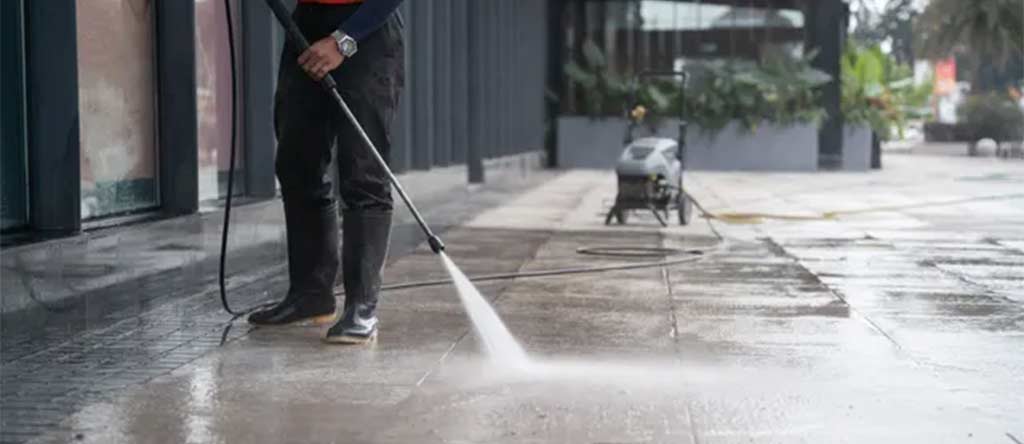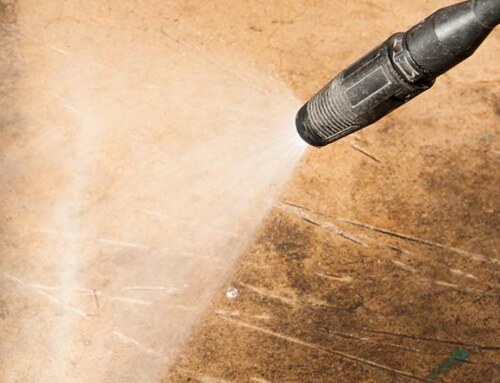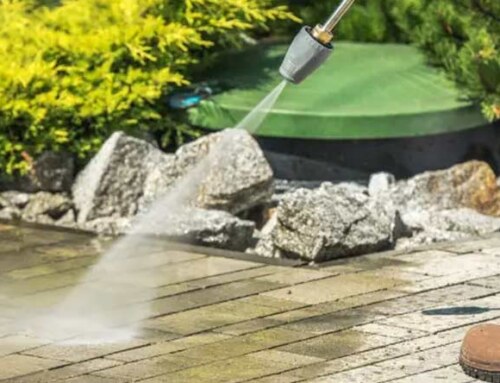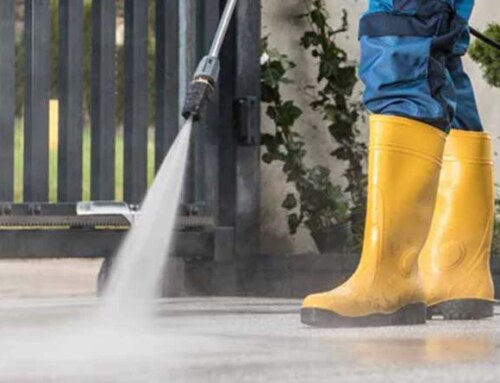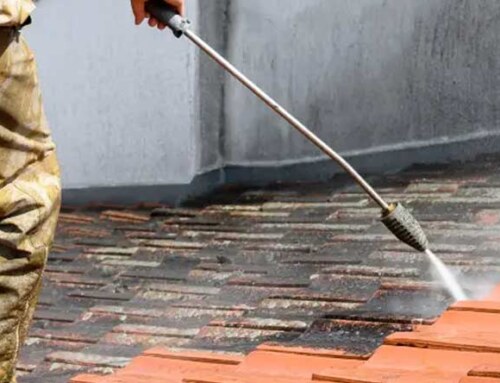Although soft washing uses a gentle stream and specialized cleaning solutions to remove dirt, mold, and bacteria, it often falls short when tackling stubborn grime and deep-seated stains. Pressure washing, on the other hand, employs a powerful jet of water, making it the go-to option for achieving a thorough, deep cleaning of driveways, sidewalks, and other tough surfaces. There are certainly many benefits of pressure washing and soft washing, but we will help you choose the best method to address your needs.
What is Soft Washing?
Let’s start with identifying what soft washing is. Soft washing is a gentler cleaning method that involves using a lower pressure stream of water combined with specialized cleaning solutions. This method is effective for cleaning delicate surfaces without causing damage. Here’s what soft washing typically includes:
- Low-Pressure Spray: Unlike pressure washing, soft washing utilizes a low-pressure spray that is safe for surfaces such as roofs, siding, and wooden decks.
- Cleaning Solutions: Soft washing employs biodegradable cleaning agents, which are designed to break down dirt, mildew, mold, and algae. These solutions are eco-friendly and can be safely used in residential settings.
- Long-Lasting Clean: The cleaning solutions used in soft washing not only clean but also prevent the recurring growth of mold and algae. This results in a longer-lasting clean compared to some other methods.
- Application Tools: Soft washing often requires specialized equipment like soft wash systems, which ensure the cleaning solutions are properly applied at the right pressure levels.
- Safe for Sensitive Surfaces: Because of the gentle nature of soft washing, it is ideal for surfaces such as older roofs, stucco, and painted wood.
The Soft Washing Process
Here’s a step-by-step breakdown of how soft washing typically works:
- Pre-inspection: The surface is inspected to identify any areas that need special attention or repairs.
- Application of Cleaning Solution: A biodegradable cleaning solution is applied to the surface.
- Dwell Time: The solution is left to sit for a specific period to break down contaminants.
- Rinsing: The surface is rinsed with low-pressure water to remove the cleaning solution and dirt.
- Final Inspection: The surface is inspected one last time to ensure it is clean.
While soft washing clearly has its advantages, we will show you why pressure washing might be a better choice for certain situations.
Why Pressure Washing is the Better Choice
Pressure washing, also known as power washing, uses high-pressure water spray to remove dirt, grime, mold, and mildew from surfaces. This method is particularly effective for hard, durable surfaces and larger areas. Here are some compelling reasons why pressure washing might be the better choice.
One of the most significant benefits of pressure washing is its sheer cleaning power. The high-pressure water can remove stubborn stains, dirt, and grime that soft washing might not be able to tackle.
Pressure washing is generally faster than soft washing. The high-pressure water can clean large areas in a fraction of the time it would take using a low-pressure method. This makes it an excellent choice for cleaning driveways, sidewalks, and large commercial properties.
Pressure washing is incredibly versatile and can be used on a variety of surfaces including:
| Surface Type | Pressure Washing Suitability |
| Concrete | Highly Suitable |
| Brick | Highly Suitable |
| Metal | Highly Suitable |
| Vinyl | Suitable |
| Wood | Not recommended for high pressure |
| Stucco | Not recommended for high pressure |
| Painted Surfaces | Not recommended for high pressure |
Pressure washing can reach deep into the pores of concrete, brick, and other hard surfaces, providing a more thorough clean. This means that not only the surface dirt is removed, but also the embedded grime within the material.
Because pressure washing is faster and more efficient, it can be more cost-effective in the long run. Additionally, the thorough cleaning helps to maintain the property, potentially saving you money on repairs and replacements.
While soft washing requires a range of cleaning solutions, pressure washing often relies more on the power of water and less on chemicals. This can be advantageous for those looking to reduce chemical usage on their property. Klein Pressure Washing always makes sure that our technicians use the tools and chemicals that will not cause harm to you and your family.
Choosing Between Soft Washing and Pressure Washing
So, which method should you choose? The answer depends on several factors. Let’s delve into these factors to help you make a more informed decision.
Type of Surface
- Delicate Surfaces: For surfaces like roofing shingles, stucco, or historical buildings, soft washing is generally the safer option.
- Durable Surfaces: Concrete driveways, brick walls, and metal surfaces are best cleaned using pressure washing.
Condition of the Surface
- Heavily Soiled: If the area is heavily soiled with years of built-up grime, pressure washing can offer a more immediate and effective solution.
- Lightly Soiled: For areas with light dirt and organic growth, soft washing might be sufficient.
Time and Budget
- Quick Turnaround: If you need the job done quickly, pressure washing is generally faster.
- Budget Constraints: Pressure washing can be more cost-effective due to its speed, especially for large areas.
Environmental Considerations
- Minimum Chemical Use: If you prefer to limit chemical use, pressure washing can be the better choice since it often relies on water pressure alone.
- Eco-Friendly Solutions: Soft washing uses biodegradable agents, making it environmentally friendly.
Longevity of Clean
- Preventative Measures: The biodegradable agents in soft washing can offer a longer-lasting clean by killing mold and algae spores.
- Need for Deep Clean: Pressure washing provides a thorough clean but might not have the same longevity in terms of preventing future growth of mold and mildew.
Maintenance and Aftercare
Both pressure washing and soft washing require some level of maintenance and aftercare to keep your surfaces in top condition. Let’s go over what you should do post-cleaning to maintain the integrity of your property.
Aftercare for Soft Washing
- Regular Inspections: Check the treated areas periodically to ensure no new growth of mold or mildew.
- Gentle Cleaning: Use mild cleaners for touch-up cleaning to maintain the integrity of the biodegradable agents.
- Surface Protection: Consider applying a protective coating on sensitive surfaces to prolong their lifespan.
Aftercare for Pressure Washing
- Sealants and Coatings: After pressure washing concrete or brick, applying a sealant can protect the surface from future stains and growth.
- Scheduled Cleanings: Depending on the environment, schedule pressure washing sessions at least once a year to maintain cleanliness.
- Repair and Replace: Inspect the surfaces for any damages caused by high pressure and repair them promptly.
Overall, choosing between pressure washing and soft washing depends on various factors. From the type of surface you’re cleaning to your budget and environmental considerations, it really depends on what your situation is. While soft washing is gentle and suitable for delicate surfaces, pressure washing offers powerful, fast, and versatile cleaning. Thus, the benefits of pressure washing are greater than that of soft washing. Contact us today to start your first cleaning project!
